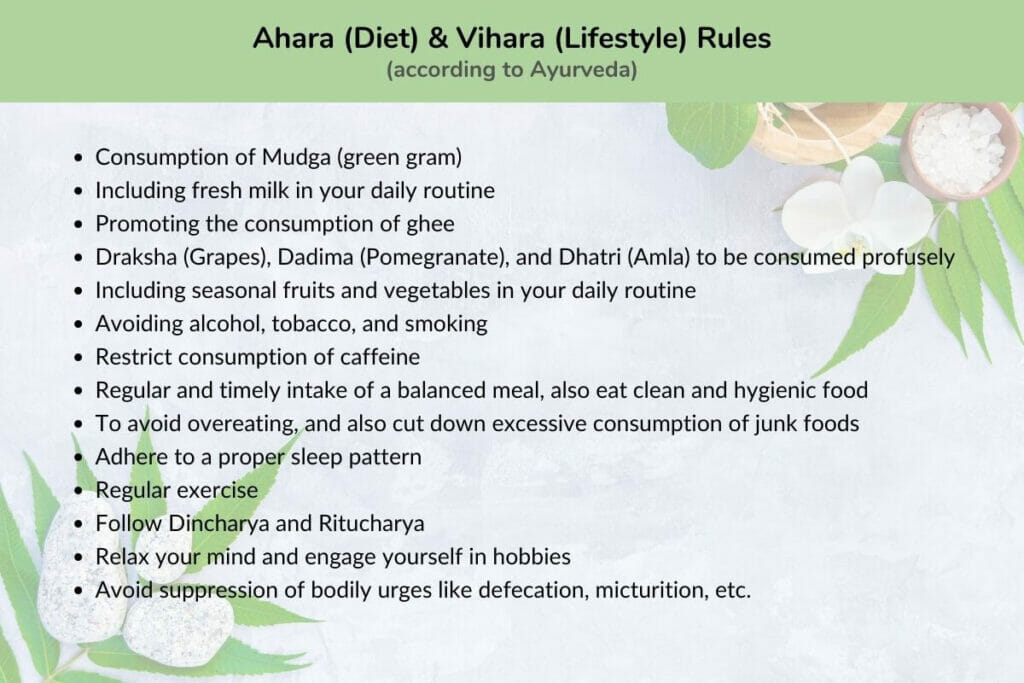At A Quick Glance: A person can be stated healthy only if she/he is physically and mentally well. In recent years, the world is becoming aware of Mental health and its importance; also, the healthcare systems are widely promoting awareness among people. This article talks about the Ayurveda perspective of Mental health, the simple Ayurveda practices that you can incorporate in your everyday life to remain mentally healthy, and also briefs about Ayurveda treatments to treat mental health disorders.
What Is Mental Health?
Mental health is an essential component of your overall health. In fact, there is no wellbeing without mental health. And, do you know, mental health is not just being without any clinically diagnosable mental health disorders?
According to the WHO,
“Mental health is a state of wellbeing in which an individual realizes his or her own abilities, can cope with the normal stresses of life, can work productively and is also able to make a contribution to his or her community.”
Thus, mental health plays a vital role in the wellbeing of an individual in every phase of their life; from school-going children to middle-aged people and the elderly.
Why Is Mental Health Important?

According to statistics, approximately one in five people have a mental health condition. A more specific study done on young adults reveals alarming facts, though!
Besides, the American Psychological Association states that mental health disorders have increased dangerously in young adults over the past decade with no significant increase in older adults.
-> Study Reiterates That Young Are More Prone To Mental Health Problems
The research by Twenge and her co-authors, published in the Journal of Abnormal Psychology, has made a few interesting observations.
- The rate of individuals in young adults reporting symptoms of major depression has increased from 8.7% to 13.2% (from 2005-2017)
- Also, there is a 71% increase in young adults reporting severe psychological distress from 2008 to 2017
- However, interestingly, there was no significant increase in mental health disorders in older adults
- In fact, the researchers saw a slight decline in psychological distress in people over 65 years of age.
Thus, it is evident, the adolescents and young are more prone to mental health problems compared to older people.
-> So, Why Is Mental Health Important?
A country’s happiness quotient depends on its productivity; besides, Young adults constitute the future workforce of any country. Hence, working towards achieving mental health remains paramount.
-> WHO’s Action Plan
So, to combat the deteriorating condition of mental health, the WHO forms a comprehensive mental health action plan 2013-2020 with goals-
- Promote mental health well being
- Prevent mental disorders
- Provide care and enhance recovery
- And, also, to reduce the mortality, morbidity, and disability of a person with mental illnesses
Various Medicine Systems’ Approach To Tackle Mental Health Problems
There are several systems of medicine in the world, and allopathic medicine is the most followed. However, in the past few decades, we observe that alternative medicine and complementary medicine are gaining popularity and have been used along with modern medicine in managing chronic medical conditions. Ayurveda is one of the alternative medicine systems that has struck a chord with many, in addressing both physical and mental health problems.
When it comes to mental health, the symptoms can range from mild to moderate, severe, and very severe. As you may know, the treatment in modern medicine for mild to moderate symptoms would be mostly counselling sessions and lifestyle changes.
Speaking of lifestyle changes, Ayurveda strongly emphasizes on the aspect and in fact weaves the concept of mental health around various everyday practices.
Thus, to promote mental health wellbeing, to prevent mental disorders, to provide care and enhance recovery, Ayurveda strongly recommends practising Ayurveda in daily life.
The following sections talks in detail about,
- How does Ayurveda look at mental health?
- What practices does it advise?
- Ayurveda treatments for mental health disorders
Also Read:
- Living With Gratitude Leads You To Happiness
- Want Good Mental Health For You And Your Loved Ones?
- A Reader’s account on how she fought mental health issues
Understanding The Ayurveda Perspective Of Mental Health
Core Ayurveda Principles
The principles of the core of Ayurveda are:
- Consume healthy food
- Follow the principles of Dinacharya, Ritucharya, Sadvritta, and Yoga
- Dinacharya (daily regimen) is the daily routine prescribed by Ayurveda for optimal health
- Ritucharya (seasonal regimen) is the diet according to seasons
- Sadvritta is Ayurveda’s Codes of conduct
- And, Yoga is a group of physical, mental, and spiritual practices that brings harmony between mind, body, and also your soul
Adhering to the mentioned Ayurveda principles is deemed important because it plays an essential role in promoting mental health.
Mental health & Physical health are interlinked
Ayurveda does not consider Mental and Physical health as separate entities; they are interlinked. Besides, the relationship between mental and physical health is more evident in chronic conditions.
While poor mental health Hina Satva Bala is a risk factor for various chronic physical conditions, a good mental health Satva Bala is an aiding factor in treating various diseases.
Thus, understanding the relationship between mind and body is the first step to reduce the incidence of various diseases.
The concept of mind in Ayurveda
The word Manas is the one that helps to perceive, that leads to knowledge, and that also has the capability to think. It is a superior faculty that controls both sensory as well as motor functions of the body.
The three Gunas of Mana:
Satva(balance), Raja(arrogance), and Tama(indolence) are the three gunas of Mana.
The positive attributes of the mind are due to Satva, while an imbalance in raja and tamas in mind leads to mental disorders.
Thus, according to Ayurveda, an increase in Satva guna leads to a positive state of mental health and a decrease in Satva guna leads to problems such as emotional disturbances and decrease in perception.
How to increase Satva guna?
1. Ahara (Diet)
Ahara is the diet you consume. And, to emphasize the importance of Ahara(diet),
Ayurveda famously says- When diet is wrong, medicine is of no use, and when the diet is right, there is no need for medicine!
Ahara is termed as Mahabhesjaya, which means the best of all the medicines. Besides, it is one of the three sub-pillars of Ayurveda.
So, what does it do?
The type of Ahara along with the proper rules of consuming food,
- enhances thinking and decision-making qualities of mind
- increases the Satva guna
- balances the tamas and rajas guna
- also promotes mental and physical strength
Thus, an ideal Ahara(diet) and Vihara(lifestyle) have a positive effect on the constitution, strength, and wellbeing of an individual.
The image below lists a few Ahara and Vihara aspects that you can incorporate in your daily life to promote mental health:

You Might Also Like:
2. Sadvritta
Sadvritta is the rules of good conduct for mental health and social behaviour and is very important in the prevention of diseases and the promotion of health.
In fact, according to Ayurveda, a regular practice of Sadvritta is helpful in the promotion of mental health because it brings balance and peace to mind.
The image below mentions Sadvritta rules:

3. Yoga
Ayurveda also advises the practice of Yoga for the benefit of your mental health. While physical exercises increase physical flexibility, coordination, and strength, breathing practices and meditations calm and focus the mind.
Ashtanga-yoga, the eight limbs of Yoga, namely Yama, Niyama, Asana, Pranayama, Pratyahara, Dharana, Dhyana, and Samadhi act as guidelines for living a meaningful, happy and purposeful life. Besides, it also brings inner peace, that is vital for mental health.
Did you know? Slow and deep breathing is the key to quieting the mind
Here is a list of asanas that are helpful in promoting your mental health.
- Balasana (Child Pose)
- Uttanasana (Standing forward bend)
- Makarasana (Crocodile Pose)
- Yastikasana (Stick Pose)
- Janu Sirsasana (Head To Knee forward bend)
- Setu-Bandha Sarvangasana (Bridge Pose)
The image below shows the asanas that are helpful in promoting mental health:

Manas-Roga (Mental Disorders)
There are several mental disorders such as Depression, Anxiety, Bipolar disorders, Stress, and other psychoses; and they are characterized by a combination of abnormal thoughts, perceptions, emotions, behaviour, and also relationships with others.
The disorders are usually caused due to Alpa-Satva and imbalance in Mansik dosha along with emotional disturbances.
Treatment in Ayurveda
Following are the Ayurveda treatments to treat mental health disorders:
1. Sattvajaya Chikitsa-
- It is the most crucial part of treating mental disorders and maintaining mental health; in other words, it is psychotherapy used in mental wellbeing.
- The treatment tries to bring the Dhi (intellect), Dhriti (fortitude), and Smriti (memory) of an individual into a proper condition by,
- mind control method
- adapting moral and behavioural code
- withdrawal of bad habits
- adopting good practices
- changing jealousy into affection
- and, finally, changing ignorance by knowledge
- So, in simple terms, it is a withdrawal of the mind from unwholesome activities.
2. Yuktivypashraya Chikitsa-
- The treatment is entirely based on the palliative drugs and Panchakarma procedure.
- Ayurveda medicines work as a brain tonic as well as a stimulant to provide better mental health.
- Medicines such as Brahmi, Shankhpushpi, Yastimadhu, Jyotishmati, and Kushmanda are used.
- Use of Medhya Rasayan– The group of medicinal plants such as Mandukaparni, Yasthimadhu, Guduchi, and Shankhpushpi helps in improving memory, boosts nourishment, health, memory, intellect, immunity, and longevity.
- Panchakarma procedures such as Vamana, Virechana, Basti, Shiroseka, Shiropichu, Shirodhara, Shirobasti, and Nasya are useful in treating mental diseases.
3. Daivavypashraya Chikitsa-
- A Divine or a Spiritual therapy
- It includes Mantra (incantations), Manidharana (wearing spiritual stones), Mangalam (Rites), Hawan, Bali, etc.
- Also, the treatment is based on Prabhava (unknown/unexplainable mode of action)
A Quick Recap
So, to promote mental health and prevent illness, there is a need to create a lifestyle that supports mental wellbeing.
- Ahara (diet) that is pleasing to the senses, when consumed as per Ayurveda guidelines, kindles a fire and promotes mental as well as physical strength.
- Sadvritta (rules of living) plays a vital role in the maintenance of mental health; also, it paves the way to a clean mind and body.
- Last but not least, Yoga enhances the quality of living in both diseased as well as healthy beings. It is effective at improving mental and physical health measures such as stress, anxiety, emotional disturbances, obesity, etc.
Thus, the regular practice of the core guidelines of Ayurveda improves your mental health and prevents you from mental health disorders. Also, there are effective treatments such as Panchakarma in Ayurveda to cure you of mental disorders.
Edited by love4wellness | Images from canva.com
